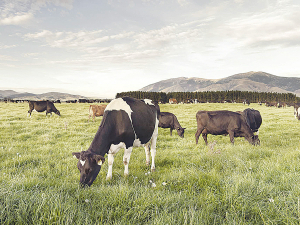Green no more?
OPINION: Your old mate has long dismissed the Greens as wooden bicycle enthusiasts with their heads in the clouds, but it looks like the ‘new Greens’ may actually be hard-nosed pragmatists when it comes to following voters.
 Between 2022 and 2023, total emissions from agriculture decreased 2.2%, including a 1.6% drop in dairy cattle emissions.
Between 2022 and 2023, total emissions from agriculture decreased 2.2%, including a 1.6% drop in dairy cattle emissions.
Emissions by dairy cattle decreased by 1.6% according to the latest NZ Greenhouse Gas Inventory report.
It shows that between 2022 and 2023, total emissions from agriculture decreased 2.2% which included a 1.6% drop in dairy cattle emissions due to a fall in dairy cow numbers.
DairyNZ general manager Farm Solutions & Policy, Dr David Burger, says this is part of a trend that has seen methane emissions from dairy cattle decrease by 4.11% since 2017. He says DairyNZ statistics show a 3.4% decrease in cow numbers - from 4.84 million in the 2021/22 season to 4.67 million in the 2022/23 season.
“But at the same time, average milk production per cow increased over this same period by 1.8%, up to 393kgMS from 386kgMS,” he says.
Dr Burger says our dairy farmers continue to work hard to improve onfarm efficiency and their environmental footprint, with the report reflecting that. He says improved productivity in farming has enabled agricultural emissions to fall since 2014 and DairyNZ is supporting that through a dedicated programme of work focused sharply on productivity, resilience and sustainability.
“This includes our work to advocate for fair and achievable climate targets and our research into solutions for farmers to understand and manage their emissions,” he says.
Dr Burger says work being done includes a focus on forage species to understand their effect on baseline methane emissions and the response to other mitigation technologies in a pasture-based system. He says they are supporting different delivery mechanisms for getting methane solutions into our grazing systems, working to improve the accuracy of emissions accounting, including the inventory and helping farmers understand their on-farm greenhouse gas emissions.
“New Zealand dairy farmers are among the world’s most emissions efficient, and research is key to helping them maintain that position. DairyNZ is investing in research alongside a range of partners to develop and test different mitigation solutions, ensuring they are fit for use in our pasture-based systems,” he says.
Burger says DairyNZ supports the independent panel on methane recommendation that the 2050 target be adjusted to 14-15% to 24% instead of the 24-47% that is currently legislated.
“Our long-held position on climate targets is that they should reflect the latest science and warming impact of methane, while also considering the mitigation tools and technologies available to farmers,” he says.
The Meat Industry Association of New Zealand (MIA) today announced that Chief Executive Officer Sirma Karapeeva has resigned from the role.
The winners of the 2026 Hawke’s Bay/Wairarapa Dairy Industry Awards were announced at the annual awards dinner held at Copthorne Solway Park in Masterton on Thursday evening.
Environment Southland is welcoming this week’s decision by the Environmental Protection Authority (EPA) to approve the release of Blaptea elguetai, a leaf‑feeding beetle that will help control the highly invasive Chilean flame creeper.
This March, the potato industry is proudly celebrating International Women’s Day on 8 March alongside the International Year of the Woman Farmer, recognising the vital role women play across every part of the sector — from paddocks and packhouses to research, leadership, and innovation.
Fruit trader Seeka posted a record profit and returns to shareholders in 2025.
Recent weather events in the Bay of Plenty, Gisborne/Tairawhiti, and Canterbury have been declared a medium-scale adverse event.